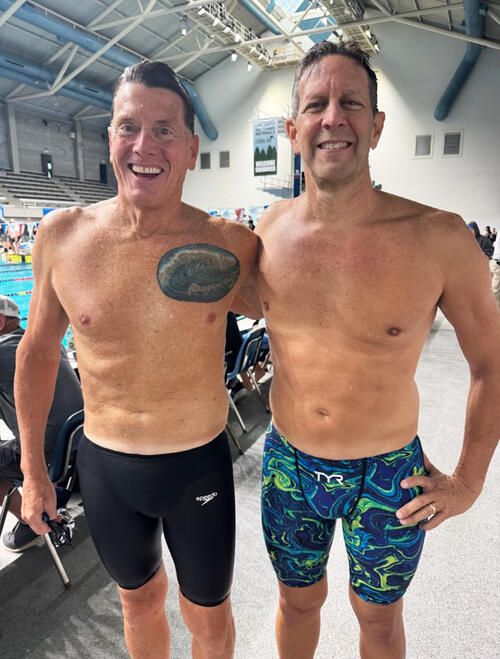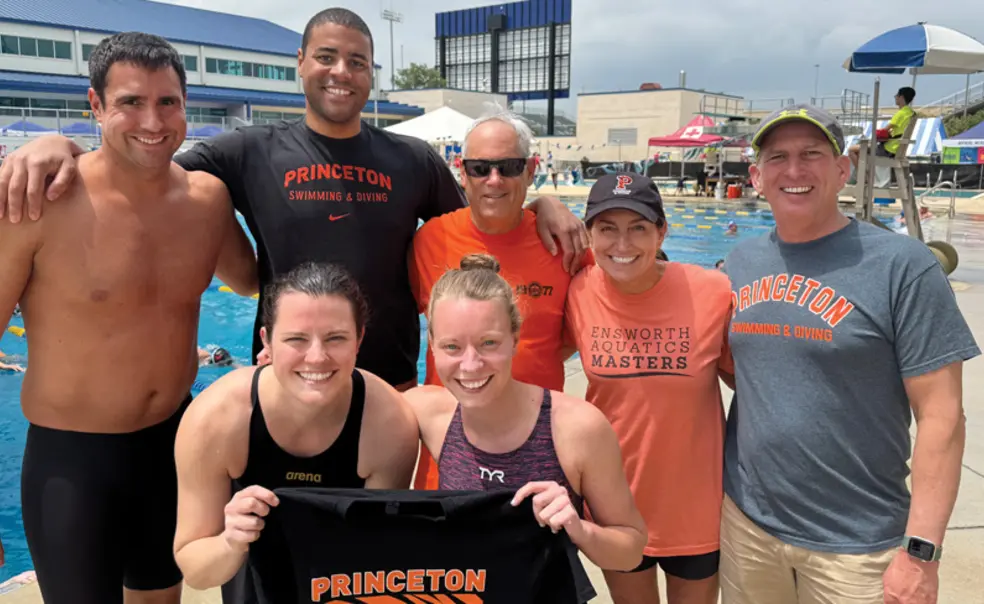Alumni Swimmers Maintain Competitive Spirit in Masters Meets
And yes, beating Harvard still matters
At the U.S. masters swimming National Championships this summer, Jim Tuchler ’87 took to the starting block alongside a group of other men in their mid-50s. Tuchler bent low, shook out his long arms, and gracefully dove into the pool alongside his fellow competitors. But they were not by his side for long. Within moments, Tuchler had left his peers far behind, cutting through the water with both power and prowess — and winning the 50-meter breaststroke heat with a nearly four-second lead.
Winning a swim meet is hardly a new experience for Tuchler, who took home Ivy League championships back when he was on the Princeton swimming and diving team. Collegiate swimmers dedicate a sizable chunk of their lives to the sport: workouts at DeNunzio Pool, sessions in the weight room, and lengthy competition seasons each year — not to mention the high school seasons that preceded them.
When Tuchler graduated, he lost this competitive outlet. Though he’d qualified for the next Olympic trials, he decided he didn’t want to dedicate another year of his life to that level of intense training. But his love of racing endured. Nearly two decades later, he discovered masters swimming, and in doing so, found a sustainable way to fuel his competitive spark.
“It’s fun to race,” Tuchler said. “You’re racing other competitors, you’re racing benchmarks like records, and you’re racing your own best time or expectation.”
U.S. Masters Swimming is a national nonprofit organization where members pay a fee to swim at a local chapter, usually on a team with a coach. Though many former pros and college athletes are drawn to masters swimming, that experience is not necessary. “A lot of people who do masters swimming aren’t that focused on the competitive aspect of it,” said Kaspar Raigla ’13, who swam on the Estonian national team. “It’s [similar to] how people go to a run club or a biking group; it’s a social activity.”
Some members do decide to compete in U.S. Masters Swimming regional and national meets, if they qualify. Chris McPherson ’89 regularly attends Nationals. “It’s interesting to me that we have a lot of Princeton alums who want to compete still,” she said. “I think part of that is that maybe we didn’t have a lot of burnout in college. I mean, that speaks a lot to the Princeton swimming program, right? That you’re leaving and still feeling great about the sport.”

Competitors are split by age group, so a swimmer in their mid-50s wouldn’t be racing against a swimmer in their mid-20s. Former athletes often gravitate toward masters as they notice their times creeping up with age, taking comfort in the fact they’ll be up against swimmers that match their physical abilities.
“Masters has a good sense of humor. Like, the team I swim for is called Fossil Fish,” Tuchler said with a chuckle. “And we have a little emblem of a skeleton fish eating another little skeleton fish. There’s a team out of D.C. called the Ancient Mariners.”
Beyond chasing records, former college swimmers look to masters swimming for a community built around longevity in the sport. Of all the sports, swimming is a good one to dedicate lifelong passion to. Swimmers can manage the intensity of their workouts, and the activity itself is low impact, allowing older adults to continue to swim even as bones and joints weaken. What’s more, studies find that swimming can help with cognitive aging and boost physical health overall.
Rusty Miller ’92, a Nashville-based former Princeton swimmer, remembers a story from the locker room after a masters meet, where he asked a gentleman in his 90s how his races went. The man responded, “You know, I don’t really think about the results anymore, but this is the best way I know to slow the slowing.”
“That really stuck with me,” Miller said. “I’m doing these things not because I want to be an elite swimmer. I’m doing these things because when I’m 80, I still want to be able to pick up my grandchildren.”
But finding a lifelong rhythm with swimming takes time. Swimming can be “a very exacting sport,” Miller said, demanding “a certain attention to perfection over time” that can wear participants thin. “There’s a great deal of time and effort invested in getting to the level of a Division I program and being able to contribute at that level — and that intensity builds on itself.” When college swimmers graduate and leave that day-to-day intensity behind, many feel the need to step away from the pool for a while.
For Morgan Casper ’16, the break came as a result of the demands of her medical residency program at the University of California, Davis. “My schedule was so hectic and haywire that I didn’t even know the days from the nights, let alone where the pool was,” Casper said. But eventually, Casper found her way back via masters swimming. “I wanted to find something that got me back to my roots,” she said. “I feel like swimming is just always who I am and where I feel back to myself.”
Returning to the pool can also mean rediscovering a sense of belonging. On a masters swimming team, “there’s so much great camaraderie with people that you’re swimming with,” said Craig Petersen ’82. “And maybe misery loves company, too,” he added dryly.
Swimming might seem like an individual pursuit, but Petersen knows a thing or two about the shared bond between swimmers. He met his wife, Charlotte Petersen ’82, when they were on the swim team together at Princeton. They got married the day after they graduated and “still swim together all the time,” Craig said. The couple now swim on the same masters team in Denver, doing laps in adjacent lanes at their weekly practices. “[Swimming is] a language that not everyone understands,” said Charlotte, “and we can just go into the shorthand of it.”
For many other Tigers, the pull of the pool is also a pull toward one another. Princetonians get together at Nationals every year, thanks in large part to McPherson, who was captain of the team during her time at Princeton. Now, she coaches the masters team she founded, Ensworth Aquatics Masters, in Nashville, and organizes annual dinners for Tigers who attend the national masters meet.
“It’s fun to have that shared bond [with other Tigers],” said Tuchler, who regularly attends the dinners. “In many cases, we had the same coach over the years, but in any event, we certainly had the same tradition — and the same desire to kick Harvard’s ass.”
And the dinners aren’t just open to former swim team members. McPherson describes walking around the pool at Nationals, searching for and spotting Princeton caps and T-shirts on the deck. “I was disheartened to see a couple Harvard swimming ones,” she deadpanned. Each year, her list grows as more grads introduce themselves.
Bob Anderson ’77, a former walk-on to the crew team, is another regular attendee at these dinners. At first, Anderson admitted, he felt a little out of place. “The conversation would be all sorts of things about the [swim] coaches,” he said, smiling. “That didn’t really mean a lot to me.” But the dynamic shifted over time. “As we’ve gotten to know each other over the years, the conversation branches out. It’s become one of the larger sets of people I know at Nationals,” he said. “I know the breaststrokers, I know the people that do the 200 fly — and I know the Princeton swimmers.”












1 Response
Pam Phillips Torrey ’83
2 Months AgoSwimming Friendships (and Reunions)
While we didn’t compete at the USMS Spring Nationals, former Tiger swimmers Julie Clarke, Colleen O’Connell, Karen Smyers, Karen Weisel, and I celebrated 46 years of friendship in October on Cape Cod. Undaunted by the cold, we swam together in beautiful Herring Pond. Plans are underway for our next gathering and swimming adventure!